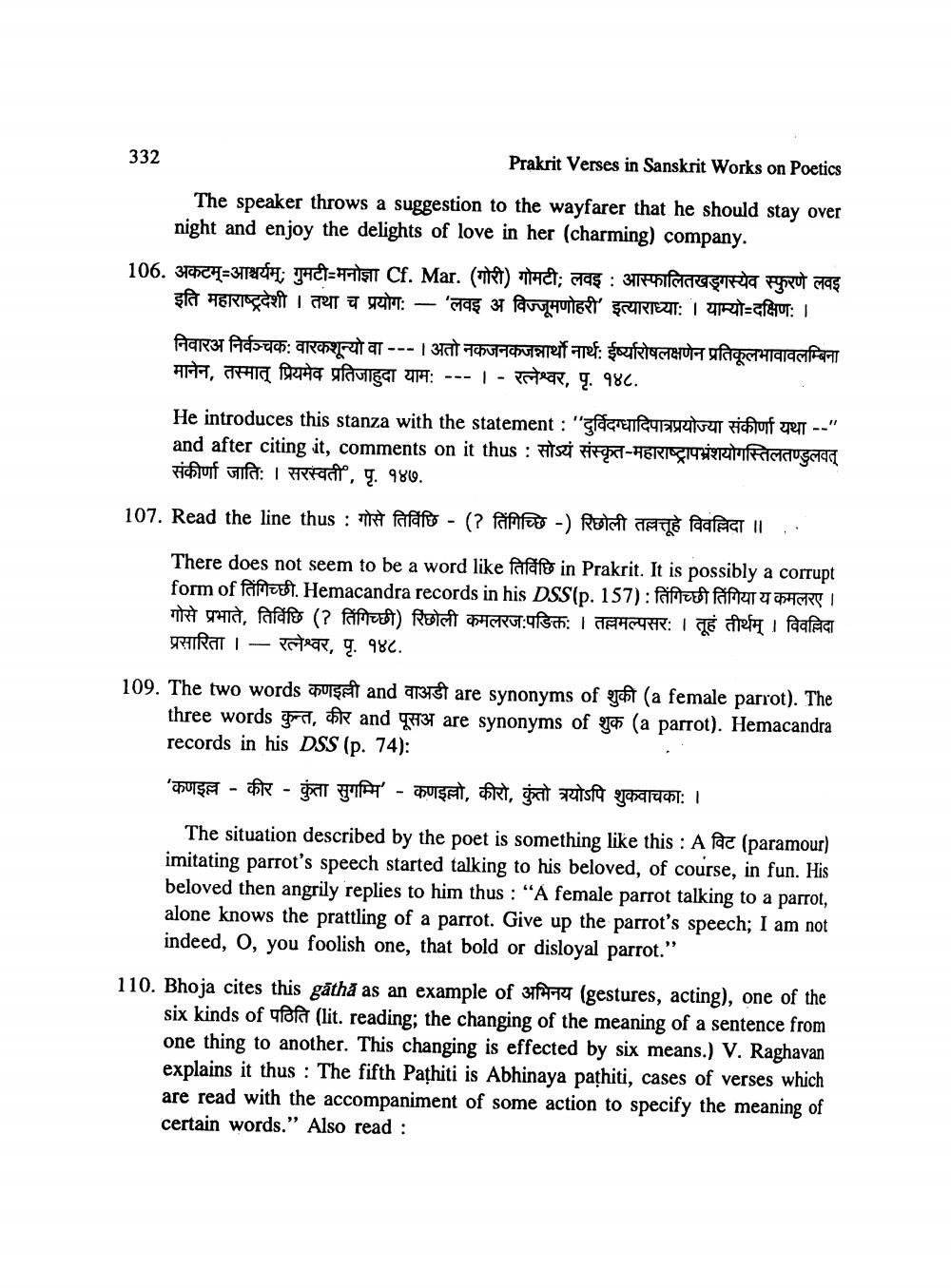________________
332
Prakrit Verses in Sanskrit Works on Poetics
The speaker throws a suggestion to the wayfarer that he should stay over night and enjoy the delights of love in her (charming) company.
106. अकटम् आश्चर्यम्; गुमटी-मनोज्ञा Cf. Mar. (गोरी) गोमटी; लवइ : आस्फालितखड्गस्येव स्फुरणे लवइ
इति महाराष्ट्रदेशी । तथा च प्रयोग: - 'लवइ अ विज्जूमणोहरी' इत्याराध्या: । याम्यो-दक्षिण: ।
निवारअ निर्वञ्चक: वारकशून्यो वा --- | अतो नकजनकजन्नार्थो नार्थ: ईर्ष्यारोषलक्षणेन प्रतिकूलभावावलम्बिना मानेन, तस्मात् प्रियमेव प्रतिजाहुदा याम: --- | - रत्नेश्वर, पृ. १४८.
He introduces this stanza with the statement : "दुर्विदग्धादिपात्रप्रयोज्या संकीर्णा यथा --" and after citing it, comments on it thus : सोऽयं संस्कृत-महाराष्ट्रापभ्रंशयोगस्तिलतण्डुलवत् संकीर्णा जाति: । सरस्वती, पृ. १४७.
107. Read the line thus : गोसे तिविछि - (? तिगिच्छि -) रिछोली तल्लत्तूहे विवल्लिदा ॥ .
There does not seem to be a word like fagio in Prakrit. It is possibly a corrupt form of तिगिच्छी. Hemacandra records in his DSS(p. 157) : तिंगिच्छी तिगिया य कमलरए । गोसे प्रभाते, तिविछि (? तिगिच्छी) रिछोली कमलरज:पडिक्तः । तल्लमल्पसरः । तूहं तीर्थम् । विवलिदा प्रसारिता । - रत्नेश्वर, पृ. १४८.
109. The two words कणइल्ली and वाअडी are synonyms of शुकी (a female parrot). The
three words कुन्त, कीर and पूसअ are synonyms of शुक (a parrot). Hemacandra records in his DSS (p. 74):
'कणइल्ल - कीर - कुंता सुगम्मि' - कणइल्लो, कीरो, कुंतो त्रयोऽपि शुकवाचका: ।
The situation described by the poet is something like this: Apac (paramour) imitating parrot's speech started talking to his beloved, of course, in fun. His beloved then angrily replies to him thus : “A female parrot talking to a parrot, alone knows the prattling of a parrot. Give up the parrot's speech; I am not indeed, O, you foolish one, that bold or disloyal parrot."
110. Bhoja cites this gatha as an example of अभिनय (gestures, acting), one of the
six kinds of ufafa (lit. reading; the changing of the meaning of a sentence from one thing to another. This changing is effected by six means.) V. Raghavan explains it thus : The fifth Pathiti is Abhinaya pathiti, cases of verses which are read with the accompaniment of some action to specify the meaning of certain words." Also read :




